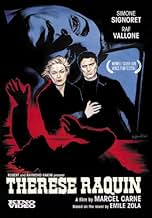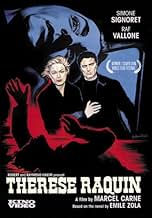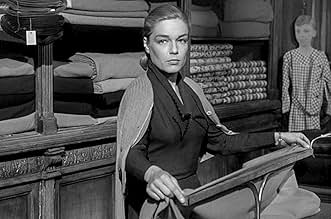VALUTAZIONE IMDb
7,4/10
2040
LA TUA VALUTAZIONE
Un camionista uccide il marito della donna che ama e diventa l'oggetto di minacce.Un camionista uccide il marito della donna che ama e diventa l'oggetto di minacce.Un camionista uccide il marito della donna che ama e diventa l'oggetto di minacce.
- Regia
- Sceneggiatura
- Star
- Premi
- 2 vittorie e 2 candidature totali
Martial Rèbe
- Grivet
- (as Martial Rebe)
Francette Vernillat
- Françoise, la bossue
- (as Françoise Vernillat)
Madeleine Barbulée
- Madame Noblet, une cliente
- (as Madeleine Barbulé)
Recensioni in evidenza
Emile Zola wrote page turners. He focused on the injustices of the great unwashed of France, from miners to prostitutes. His books were incredibly naturalistic and moralistic. His characters seldom came through unscathed but made a statement about the cultural milieu of the time. This is a story about passion. Therese Raquin is the wife of a tiresome mama's boy hypochondriac. She is beautiful and is married to this childish wimp. Along comes the handsome truck driver after she has spent six empty years with this guy. They have tryst and even let the husband know that he is going to lose his wife. Everything changes when, on a train trip to Paris, fate takes over. Granted, there are lots of plot contrivances, but that's the literary style of the period. Also, in the naturalist tradition, the characters often lose control of their destinies. There is a broader moral sense that trumps the likable ending that people are used to in movies made at this time. The writer and the director can't turn their backs on issues like these and so life goes on and the impulsive and evil are punished alike.
Despite the considerable talent involved, this tale of passion and murder is pallid stuff. It's filled with bald plot-twists, ending with the ultimate of deux ex machinas, a huge truck careening down a small street for no reason except to kill off a major character, thus creating the pat ironic ending. Every plot twist is unconvincing, from the idea that Vallone and Duby would hit it off in any context, or that the couple would plan to leave a day or so after they told her husband about their affair rather than immediately, to the mother conveniently having a totally paralysing stroke at just the right moment. I guess one can blame Zola for some of this, but this updated version adds nothing.
Marcel Carné is mostly known for the films he made before the Second World War (such as "Le quai des brumes" (1938) and "Le jour se leve" (1939)), but also in 1953 he is still able to make an excellent film noir (for a change from the country that invented the name of this genre).
The somewhat forgotten Roger Hubert is responsible for the beautiful black and white photography and Simone Signoret plays the femme fatale. I always remember Signoret the way she looked in her later years, her appearance thoroughly neglected, and every time I see a movie from her early days I am amazed how beautiful she ones was.
The film begins rather weak. A young woman is married to a man that is silly in a caricatural way but does have a very attractive friend. There are more subtle ways to indicate that the film will be about adultery.
Over time however the film goes stronger and stronger. The surprising ending nearly equals that of "Diabolique" (1955, Henri Georges Clouzot), also with Simone Signoret. What was most interesting to me however was the middle part, the confrontation between the woman and the mother in law afer the dead of the husband. In reality these confrontations are confrontations of the woman with her own conscience. This part of the film resonates the work of writers as Poe and Dostojevski.
To conclude, something for the real filmbuffs. Maria Pia Casilio plays a tiny part as chambermaid in a hotel. From the first second I saw her I thought "I know that girl, she plays Maria in "Umberto D" (1952, Vittorio de Sica)". A little investigation proved that I was right, so I can count myself as a filmbuff.
The somewhat forgotten Roger Hubert is responsible for the beautiful black and white photography and Simone Signoret plays the femme fatale. I always remember Signoret the way she looked in her later years, her appearance thoroughly neglected, and every time I see a movie from her early days I am amazed how beautiful she ones was.
The film begins rather weak. A young woman is married to a man that is silly in a caricatural way but does have a very attractive friend. There are more subtle ways to indicate that the film will be about adultery.
Over time however the film goes stronger and stronger. The surprising ending nearly equals that of "Diabolique" (1955, Henri Georges Clouzot), also with Simone Signoret. What was most interesting to me however was the middle part, the confrontation between the woman and the mother in law afer the dead of the husband. In reality these confrontations are confrontations of the woman with her own conscience. This part of the film resonates the work of writers as Poe and Dostojevski.
To conclude, something for the real filmbuffs. Maria Pia Casilio plays a tiny part as chambermaid in a hotel. From the first second I saw her I thought "I know that girl, she plays Maria in "Umberto D" (1952, Vittorio de Sica)". A little investigation proved that I was right, so I can count myself as a filmbuff.
Thérèse Raquin (AKA: The Adultress) is directed by Marcel Carné and Carné co-adapts the screenplay with Charles Spaak from the Émile Zola novel. It stars Simone Signoret, Raf Vallone, Jacques Duby, Maria Pia Casilio and Roland Lesaffre. Music is by Maurice Thiriet and cinematography by Roger Hubert.
Carné reworks Zola's novel to be set in post-war Lyon and slips into a film noir gear. Plot essentially finds Signoret as Raquin, a severely repressed woman stuck in a marriage to her wimpy weasel of a cousin, not only that but she also has to share a home with his domineering mother. Then one day the strapping Laurent LeClaire (Vallone) enters her life, sparking a fiery affair, but as plans for the future are plotted, a turn of events drastically changes everything.
The characterisations are strongly performed, the five principals (Lesaffre arrives late in the play as a key character) giving performances that really draw you into their respective worlds, for better or worse as regards the human condition. Carné skillfully blends the beautiful side of Lyon, such as the quaint cobbled streets and the River Rhone, with a dull bleakness that fogs Thérèse, a woman who has forgotten how to smile, sexual fulfilment a non entity. Hubert also brings his photographic skills to the show, providing some blisteringly gorgeous night shots that offer hope for the new found lovers. But there is a sign post up ahead and it says that the next stop is noirville, and after having spent half the film building his characters, Carné dashes hope and replaces it with misery. Fate plays a big part in the crux aspects of the film, a film noir staple of course, right up to the clinical finale that comes with a thunderous fait accompli.
It's a bit draggy in parts as the director is at pains to show the humdrum side of life, but the change of gear at the mid-point - and the brilliant last quarter, make this a worthy addition for collectors of Frenchie noir. 8/10
Carné reworks Zola's novel to be set in post-war Lyon and slips into a film noir gear. Plot essentially finds Signoret as Raquin, a severely repressed woman stuck in a marriage to her wimpy weasel of a cousin, not only that but she also has to share a home with his domineering mother. Then one day the strapping Laurent LeClaire (Vallone) enters her life, sparking a fiery affair, but as plans for the future are plotted, a turn of events drastically changes everything.
The characterisations are strongly performed, the five principals (Lesaffre arrives late in the play as a key character) giving performances that really draw you into their respective worlds, for better or worse as regards the human condition. Carné skillfully blends the beautiful side of Lyon, such as the quaint cobbled streets and the River Rhone, with a dull bleakness that fogs Thérèse, a woman who has forgotten how to smile, sexual fulfilment a non entity. Hubert also brings his photographic skills to the show, providing some blisteringly gorgeous night shots that offer hope for the new found lovers. But there is a sign post up ahead and it says that the next stop is noirville, and after having spent half the film building his characters, Carné dashes hope and replaces it with misery. Fate plays a big part in the crux aspects of the film, a film noir staple of course, right up to the clinical finale that comes with a thunderous fait accompli.
It's a bit draggy in parts as the director is at pains to show the humdrum side of life, but the change of gear at the mid-point - and the brilliant last quarter, make this a worthy addition for collectors of Frenchie noir. 8/10
People generally think that Carné's heyday comes to an end with "les portes de la nuit" (1946)And it's sure that- whatever the new wave's view on the matter-these thirties and forties movies are among the very best French cinema gave to the world("le jour se lève" "quai des brumes""les enfants du paradis" and "hôtel du nord" ,to name but four are the crème de la crème ,easily equalling the best of Renoir)One always tries to minimize Carné's importance,mentioning the actors (Gabin,Arletty,Simon,et al)and Jacques Prévert's screen plays.One often forgets that Carné did direct these masterworks and he always chose the right actors,decorators(Alexandre Trauner who was to work in Hollywood later),musicians,with mind-boggling results.
"Therese Raquin" (1953)came before the new wave but Carné 's credibility was sinking fast and he was given the coup de grace by his young "nouvelle vague" colleagues -before being restored to favor after 1980,actually after he stopped directing ."Therese Raquin is a fine mixing of pre and post -war elements
Pre-war:the lovers' impossible dream,fate -here represented by a young sailor-,scumbags who cannot stand true love-the scene on the train between Raf Vallone and Jacques Duby recalls the famous one between Jean Gabin and Jules Berry in "le jour se lève" (1939) particularly when Vallone screams"are you gonna shut your mouth?"(the lines are almost the same).
Post-war:the influence of the film noir-which was influenced by Marcel Carné's work mainly "le jour se lève"-who cares if it's a Zola adaptation?:the scenarists have transposed the action to the fifties,to the era of the making of the movie,and James Cain could have written it as the story reminds the spectator "the postman always rings twice:more than Tay Garnett's excellent version(1946),"Therese Raquin" is actually closer to Luchino Visconti's (Ossessione,1942),because of the Italian Raf Vallone's presence.
But in spite of the transposition,Zola's spirit remains intact:the stifling petit bourgeois milieu in which Thérèse (Simone Signoret)lives is meticulously depicted:the notions store ,the walk on the Rhone banks,the ludicrous board game,the dreadful mother-in-law(Sylvie is absolutely extraordinary;after she suffered an attack after her son's death,she's completely paralyzed ; only her eyes (her frightening eyes) are alive,accusing her daughter-in-law:Cain's eye in the Bible.In her over possessive part of a mother who has turned her only child into a poor guy,a sissy,Sylvie surpasses the excellent Signoret and Vallone.
No,Carné's career was not over in 1946,but after "Thérèse Raquin",the slump began:""les tricheurs" (1958)tried to catch up with the nouvelle vague with mixed artistical results,but has remained watchable."Trois chambres à Manhattan" (1965)was moderately interesting,thanks to its stars ,Maurice Ronet and Annie Girardot.After,it's downhill:"les jeunes loups" (1967)is a would be "a la mode" bomb,"les assassins de l'ordre"(1971) tried André Cayatte's style ,not exactly the right move and "la merveilleuse visite"(1973) failed dismally(as in "les visiteurs du soir",(1942),Satan sent two people,it's God's turn who send an angel!)
"Thérèse Raquin" should not be missed.You won't be disappointed .
"Therese Raquin" (1953)came before the new wave but Carné 's credibility was sinking fast and he was given the coup de grace by his young "nouvelle vague" colleagues -before being restored to favor after 1980,actually after he stopped directing ."Therese Raquin is a fine mixing of pre and post -war elements
Pre-war:the lovers' impossible dream,fate -here represented by a young sailor-,scumbags who cannot stand true love-the scene on the train between Raf Vallone and Jacques Duby recalls the famous one between Jean Gabin and Jules Berry in "le jour se lève" (1939) particularly when Vallone screams"are you gonna shut your mouth?"(the lines are almost the same).
Post-war:the influence of the film noir-which was influenced by Marcel Carné's work mainly "le jour se lève"-who cares if it's a Zola adaptation?:the scenarists have transposed the action to the fifties,to the era of the making of the movie,and James Cain could have written it as the story reminds the spectator "the postman always rings twice:more than Tay Garnett's excellent version(1946),"Therese Raquin" is actually closer to Luchino Visconti's (Ossessione,1942),because of the Italian Raf Vallone's presence.
But in spite of the transposition,Zola's spirit remains intact:the stifling petit bourgeois milieu in which Thérèse (Simone Signoret)lives is meticulously depicted:the notions store ,the walk on the Rhone banks,the ludicrous board game,the dreadful mother-in-law(Sylvie is absolutely extraordinary;after she suffered an attack after her son's death,she's completely paralyzed ; only her eyes (her frightening eyes) are alive,accusing her daughter-in-law:Cain's eye in the Bible.In her over possessive part of a mother who has turned her only child into a poor guy,a sissy,Sylvie surpasses the excellent Signoret and Vallone.
No,Carné's career was not over in 1946,but after "Thérèse Raquin",the slump began:""les tricheurs" (1958)tried to catch up with the nouvelle vague with mixed artistical results,but has remained watchable."Trois chambres à Manhattan" (1965)was moderately interesting,thanks to its stars ,Maurice Ronet and Annie Girardot.After,it's downhill:"les jeunes loups" (1967)is a would be "a la mode" bomb,"les assassins de l'ordre"(1971) tried André Cayatte's style ,not exactly the right move and "la merveilleuse visite"(1973) failed dismally(as in "les visiteurs du soir",(1942),Satan sent two people,it's God's turn who send an angel!)
"Thérèse Raquin" should not be missed.You won't be disappointed .
Lo sapevi?
- QuizRaf Vallone refused to be dubbed in the French version and had his contract amended accordingly. The scenario was also slightly changed to "Italianize" the character of Laurent.
- ConnessioniFeatured in Mémoires pour Simone (1986)
I più visti
Accedi per valutare e creare un elenco di titoli salvati per ottenere consigli personalizzati
- How long is The Adultress?Powered by Alexa
Dettagli
- Tempo di esecuzione
- 1h 42min(102 min)
- Colore
- Proporzioni
- 1.37 : 1
Contribuisci a questa pagina
Suggerisci una modifica o aggiungi i contenuti mancanti



























